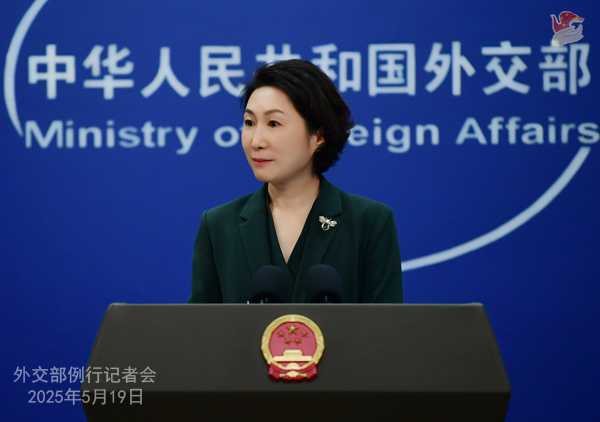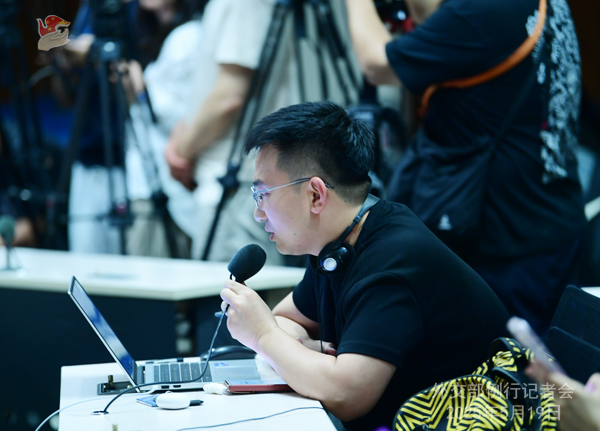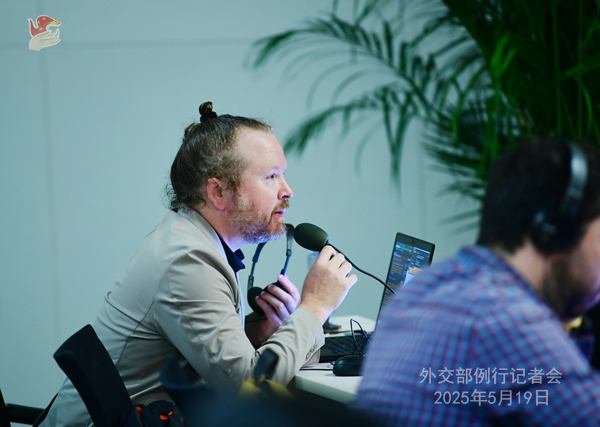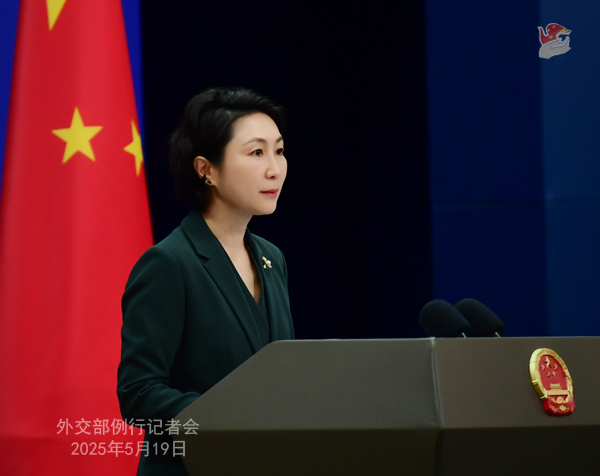
People’s Republic of China


At the invitation of Member of the Political Bureau of the CPC Central Committee and Foreign Minister Wang Yi, Deputy Prime Minister and Foreign Minister of Pakistan Mohammad Ishaq Dar will visit China from May 19 to 21.
At the invitation of Member of the Political Bureau of the CPC Central Committee and Foreign Minister Wang Yi, Foreign Minister of the Netherlands Caspar Veldkamp will visit China from May 21 to 22.
CCTV: Both China and Pakistan announced that Pakistan’s Deputy Prime Minister and Foreign Minister Mohammad Ishaq Dar will visit China, how does China comment on its relations with Pakistan, and what is China’s expectation for the visit?
Mao Ning: China and Pakistan are all-weather strategic cooperative partners. The two countries maintain close high-level exchanges and cooperation in various areas. China stands ready to work with Pakistan through this visit to further deliver on the important common understandings between the leaders of the two countries, enhance strategic communication and coordination, and deepen exchange and cooperation in various areas, so as to advance the bilateral relations and accelerate the building of a closer China-Pakistan community with a shared future in the new era.
Global Times: To follow up on your announcement that Minister of Foreign Affairs of the Netherlands Caspar Veldkamp will visit China, how do you assess the current China-Netherlands relations and what does China expect to achieve through the visit?
Mao Ning: China and the Netherlands boast an open and pragmatic partnership for comprehensive cooperation. In recent years, the bilateral relationship has maintained steady and sound development. The two countries have frequent high-level exchanges and are each other’s important trade and investment partners. Cooperation in such fields as agriculture, water conservancy and science and technology achieved steady progress and significant outcomes, delivering benefit to the two peoples.
The upcoming visit is Minister of Foreign Affairs Caspar Veldkamp’s first visit to China since he took office. China hopes that the two sides through this visit will have in-depth exchanges on bilateral relations and international and regional issues of mutual interest, expand common understandings, deepen cooperation, inject new impetus into the development of China-EU relations, and contribute to upholding multilateralism, the international order underpinned by international law and an open world economy.
Reuters: Moody’s has downgraded the United States’ triple-A sovereign credit rating, with a warning about the American government’s high debt levels. How does China view this downgrade, given China is one of the major holders of U.S. treasuries? Is China worried about it?
Mao Ning: We noted the relevant reports. The U.S. should take responsible policy measures to keep the international financial and economic systems stable and protect investors’ interests.
China Daily: The 34th Ordinary Session of the Council of the League of Arab States (LAS) at the Summit Level was held in Baghdad, the capital of Iraq, on May 17. President Xi Jinping sent a congratulatory letter to Iraqi President Abdul Latif Rashid, the rotating chairperson of the summit, on the convening of the meeting. We noted that the official website of the LAS published the full text of the letter. Can you share more information with us? The summit adopted the Baghdad Declaration, demanding an immediate end to the aggression on Gaza and an end to hostilities that are increasing the suffering of civilians, rejecting any attempt to displace Palestinians in Gaza, supporting general presidential and parliamentary elections within a year in all Palestinian territories, including the Gaza Strip, the West Bank and East Jerusalem, and urging countries and international and regional financial institutions to provide financial support to back the Gaza reconstruction plan. What is China’s comment?
Mao Ning: On May 17, the 34th Ordinary Session of the Council of the League of Arab States (LAS) at the Summit Level was held in Baghdad, the capital of Iraq. President Xi Jinping sent a congratulatory letter to Iraqi President Abdul Latif Rashid, the rotating chairperson of the summit. In the letter, he hailed the achievements of the LAS over the past 80 years since its founding, and noted that China stands ready to work with Arab states to deepen political mutual trust, promote mutually beneficial cooperation, enhance cultural and people-to-people exchanges, strive forward together on our respective path to modernization, and build a China-Arab community with a shared future at a higher level. This is the 11th time in a row that President Xi Jinping sent a congratulatory letter to the summit, which fully demonstrates the great importance China attaches to growing its relations with Arab states.
Under the strategic guidance of President Xi Jinping and leaders of Arab states, relations between the two sides maintain rapid and steady growth. In 2022, the first China-Arab States Summit was smoothly held. In 2024, President Xi Jinping and multiple heads of state of Arab states attended the opening ceremony of the 10th ministerial meeting of the China-Arab States Cooperation Forum. In 2026, the second China-Arab States Summit will be held in China. China stands ready to work with the Arab side at the summit to carry forward our traditional friendship, expand practical cooperation, build closer bond between the people, and open up a new chapter in building a China-Arab community with a shared future.
China takes seriously the reasonable concerns and legitimate appeals of Arab states on the question of Palestine. We support an immediate realization of lasting ceasefire and real alleviation of the humanitarian crisis in Gaza. Gaza belongs to the Palestinian people and is an inalienable part of the Palestinian territory. China firmly supports the legitimate national rights of the Palestinian people, believes that “the Palestinians governing Palestine” is an important principle that must be upheld in the post-conflict governance of Gaza, and opposes the forced displacement of the people of Gaza. China stands ready to work with the rest of the international community to promote the deescalation of the situation in Gaza at an early date, and make relentless effort to advance the comprehensive, just and lasting solution to the Palestinian question on the basis of the two-State solution.

PTI: You made an announcement about Pakistan’s Foreign Minister’s visit here, but conspicuously absent in your announcement is any relationship with the current situation regarding India-Pakistan tensions. Does this visit coincide with this particular tension? Or is it a normal bilateral visit?
Mao Ning: This upcoming visit of Deputy Prime Minister and Foreign Minister Mohammad Ishaq Dar reflects the high importance the Pakistani government attaches to the development of China-Pakistan relations. Regarding the situation between India and Pakistan, China has stated its position on multiple occasions. We are willing to maintain communication with both sides and play a constructive role in realizing a full and lasting ceasefire and maintaining regional peace and stability.
China News Service: Recently, the precious Chinese cultural relics Zidanku Silk Manuscript Vol. II and III: Wuxing Ling and Gongshou Zhan were returned to China through China-U.S. cooperation on repatriation of cultural relics. What’s your comment?
Mao Ning: We saw this great news. The Zidanku Silk Manuscript has exceptional significance. It is the oldest ancient silk manuscript found in China, and the only known silk manuscript from the Warring States Period (475-221 BC) unearthed in China. It is also considered the earliest example of a classical Chinese book ever found. This is a notable case of China’s success in proactively seeking the repatriation of cultural objects lost in history, and a good example of promoting protection and return of lost cultural relics through dialogue and cooperation as advocated by China.
We applaud the effort of the Smithsonian Institution and the National Museum of Asian Art that has made this latest repatriation possible. It shows that by working together on the basis of equality and mutual respect, China and the U.S. can achieve results that benefit both sides. We hope to see more exchanges and cooperation like this which can bring our two peoples closer and contribute to the steady, sound and sustainable development of China-U.S. relationship.
Ukrinform News Agency: Last Friday in Istanbul there was an attempt to resume negotiations between the Ukrainian and Russian delegations to stop the war. However, as stated by Deputy Minister of Foreign Affairs of Ukraine Sergiy Kyslytsya, who participated in the meeting, Russians did not intend to conduct honest negotiations, but to put forward ultimatum and demanded Ukraine to recognize the occupied Ukrainian territories as Russian, and threatened that Russia could fight infinitely and seize even more of Ukraine’s sovereign territory. How does the Foreign Ministry comment on such a specific manner of conducting negotiations by the Russian side?
Mao Ning: I’m not familiar with what you said. China’s position on the Ukraine crisis is consistent and clear. We hope that relevant parties will continue to work towards a fair, lasting and binding peace agreement that can be accepted by parties concerned through dialogue and negotiation, and ultimately realize the political settlement of the crisis.
Bloomberg: An Indian military official claimed that China provided Pakistan with air defense and satellite support during its recent skirmish with India. I was wondering if the Foreign Ministry had a comment on his remarks.
Mao Ning: Both India and Pakistan are China’s important neighbors. China attaches high importance to its relations with both countries, and is committed to fostering an amicable, secure and prosperous neighborhood, the principle of amity, sincerity, mutual benefit and inclusiveness and the vision of a shared future in developing relations with all neighboring countries. Since tensions started to rise between India and Pakistan, China has followed an objective and just position, urged the two countries to exercise calm and restraint, and avoid escalation. We support and welcome the realization of ceasefire between India and Pakistan and stand ready to continue to play a constructive role for securing a full and lasting ceasefire and upholding regional peace and stability.

Reuters: China’s top trade negotiator had talks with U.S. trade representative last Thursday on the sidelines of the APEC meeting, but we’ve not seen any readout of the meeting. We’d like to know how did the talks go, and is there a next meeting scheduled? Or, if there’s any discussion of a consensus between China and the U.S. to not publicize these talks that take place during the 90-day truce?
Mao Ning: We have made clear more than once China’s position on the tariff and trade issues. I’d refer you to competent authorities for those specific questions.
Shenzhen TV: In recent weeks, Port Sudan in the east of Sudan was hit by a series of drone strikes, which damaged civilian infrastructure, including those at the airport and the port. What’s China’s comment on this?
Mao Ning: China opposes and condemns attacks targeting civilian infrastructure and civilians and calls on parties to keep civilian infrastructure safe and protect the safety of civilians. China follows an objective and just position on the issue of Sudan. We hope that a ceasefire will be realized and the humanitarian situation will be eased in Sudan as soon as possible. We hope the political process will be pushed forward and that peace, stability and development will be restored as early as possible in Sudan.
PTI: This will be the first high-level visit by a Pakistani official to China after the conflict between Pakistan and India began. What will be the kind of message that China will convey to Pakistan during Mr. Dar’s visit? Is China open to again sending the replenishment of weapons to Pakistan because there was in between a denial of any replenishment being sent by a Chinese plane to Pakistan. But during this visit, what is the kind of formal message that China would like to convey to Pakistan related to the tensions with India?
Mao Ning: The two sides will exchange views on bilateral relations and issues of common interest during Deputy Prime Minister and Foreign Minister Dar’s visit. Regarding the situation between India and Pakistan, China has stated its position many times. We are willing to maintain communication with both sides to facilitate efforts for a lasting ceasefire and work with them to maintain regional peace and stability.




